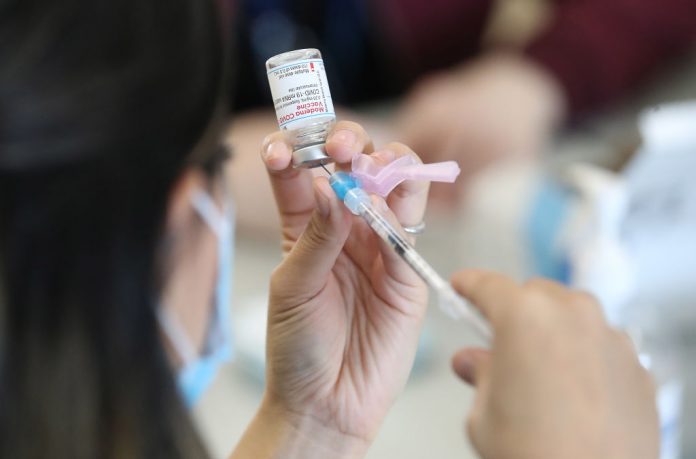Some Manitobans are now eligible for a third dose of vaccine.
Those who are moderately to severely immunocompromised due to a medical condition or treatment will be eligible, as will individuals who need a third dose for travel purposes or people who received one or two doses of a vaccine that is not approved by Health Canada.
“For those who are immunocompromised, two doses of vaccine may not provide adequate defence against COVID-19, particularly given concerns with the highly contagious delta variant,” said Dr. Joss Reimer, medical lead for the vaccination implementation task force.
Public health has administered at least one dose of vaccine to 83.9% of eligible Manitobans and two doses to 78.9%. There are 2,542 doses scheduled for Wednesday with more expected at pop up and mobile clinics.
This is the beginning of the process of putting forward a third round of vaccines, though they are only doing so when the science backs it up, or for a travel requirement. The province provided a list of immunocompromised conditions and treatments that may require a third dose. Reimer said it is not exhaustive and should be used as more of a guide for the clinician before recommending an additional dose. People in this category would include those who have cancer and receiving chemotherapy or recent organ transplant recipients or those being treated for HIV and AIDS or other immune system treatments.
They are looking at other potential demographics, like long-term care homes which were included in the first round of priorities last December and their clientele often have less effective immune systems.
Reimer also said a third dose is not being looked as a booster or the beginning of a booster system, but more as a completion of a primary series.
She noted anyone seeking a third dose needs to talk with their primary health care provider and go over the potential risks, which remain the same as any previous dose.
The province also set out guidelines for medical exemptions on Wednesday, this includes people who had severe reactions to a previous dose of a COVID vaccine or are currently undergoing a different medical treatment which would be complicated by a vaccination.
The number of people who will be eligible for a medical exemption, however, will be small and they must be confirmed by a specialist physician. Reimer said there were less than 10 individuals in Manitoba who had a severe enough reaction, like myocarditis or Guillain-Barre syndrome, to an initial dose that would allow them an exemption. She said the Health Sciences Centre Allergy Clinic has not identified anyone as being allergic to the vaccines.
The province is currently working on a version of the passport that will allow these individuals to access the same services and businesses that fully-vaccinated people can.
“We haven’t announced exactly what it’s going to be just yet because we want to make sure that whatever we do is going to be incredibly secure and would be difficult to forge,” said Reimer.
The province also announced 49 new cases of COVID-19 on Wednesday — 31 in non-vacinated individuals nine partially vaccinated and nine fully vaccinated. There was also one death announced, bring the total to 1,203. Winnipeg had 20 of the new cases while Southern Health had 17, Interlake-Eastern and Northern both had five and Prairie Mountain two.
Manitoba’s five-day test positivity rating has fallen to 2.9% from 3.2%. There were 2,364 tests completed on Tuesday.
Public health will also begin in-school vaccination clinics next week which will include COVID-19 immunizations.
The province announced the clinics in a press release on Wednesday morning. They announced clinics would be part of their safe reopening plan weeks ago, but had not announced what they would look like or when they would begin.
The clinics will also be used to catch up on other vaccinations including HPV, hepatitis B, meningococcal conjugate quadrivalent vaccine, tetanus, diphtheria and acellular pertussis or diphtheria, acellular pertussis and polio vaccines.
Consent forms will be sent home with students.
Currently, COVID-19 vaccines are approved for those aged 12 and up, which has been extended to the 2009 birth year.
The province is also planning for those aged 5-11 in case COVID-19 vaccines become approved for use for those ages.
The in-school efforts will prioritize communities that have particularly low uptakes, but Reimer said it is difficult to predict what the true uptake will be.
“We’re really trying to target … people who would be fine to take it if it was easy and available to them and those who would love to take it but face barriers,” she said.
Supersites will continue to take appointments and community-based pop ups will continue to operate. Vaccines are also still available from physicians and pharmacies.
A mobile clinic is scheduled at Provencher Park (271 de la Catherdale Avenue) in Winnipeg on Saturday from 12:30 to 4:30 p.m., in partnership with the Mex Y Can Association of Manitonba Inc. A pop-up clinic will take place at Yellowhead Centre Hall in Neepawa on Thursday from 4-8 p.m.
The province has administered 1,948,557 doses of vaccine.
































